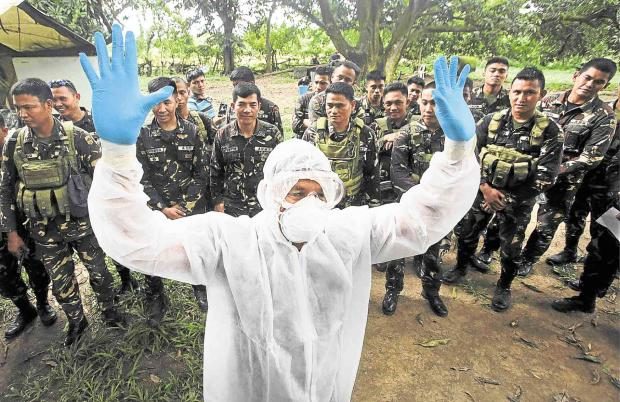42,000 chickens culled in Cabiao town in Nueva Ecija

In this photo taken in August, a soldier demonstrates how to properly wear the personal protective equipment before he and his colleagues are sent to a poultry farm in San Luis town in Pampanga province to contain the spread of the bird flu virus. (File photo by GRIG C. MONTEGRANDE / Philippine Daily Inquirer)
Published: 7:15 p.m., Nov. 27, 2017 | Updated: 11:46 p.m., Nov. 28, 2017
CABIAO, Nueva Ecija — Workers culled 42,000 chickens in a village here on Nov. 21, provincial administrator, Alejandro Abesamis, said on Monday, but neither he nor local officials had explained why.
Agriculture Secretary Emmanuel Piñol on Tuesday also neither confirmed nor denied that a new outbreak of avian influenza had struck this town, only saying the Bureau of Animal Industry (BAI) was still waiting for confirmatory tests.
Piñol said: “We commend the farm owner and the local veterinary officials for their vigilance. While waiting for confirmatory tests, they took it upon themselves to act … There is therefore no reason to be alarmed.”
“The DA (Department of Agriculture) is in full and complete control and necessary safeguards are in place,” he said in a text message.
Cabiao is near San Isidro, one of two towns quarantined in August by the DA due to bird flu infestations that forced veterinarians and poultry owners to kill about 300,000 birds there.
Sources said the chickens were raised by a poultry farm in Barangay Concepcion here. Local government records show that 15 poultry farms operate in Cabiao, five of which have been inactive since September.
Soledad Garcia, municipal veterinary officer, would not comment on the birds’ destruction, saying she was prohibited from discussing issues by the protocol established after the bird flu outbreak in August.
Possible resurgence
A bird flu outbreak was first announced on Aug. 11 in San Luis town in Pampanga province. A month later, President Rodrigo Duterte declared the outbreak over.
Given the possible resurgence of bird flu in Nueva Ecija, the DA will implement for the first time its new set of protocols created with the Philippine Council for Agriculture and Fisheries (PCAF).
According to Piñol, culling operations will now only be done in the affected farms. Other farms surrounding the area will only be subjected to random tests.
Quarantine zones and control areas surrounding the bird flu infestation site will also be removed, unlike the protocols used during the first outbreak.
This time, Piñol said, the new guidelines will not stop the movement of poultry stocks during an outbreak. In August, BAI released a memorandum banning the shipment of chickens and poultry products from Luzon to the Visayas and Mindanao.
New protocols
“These new protocols are in line with international standards and approved by the industry stakeholders during the last PCAF meeting,” Piñol said.
The DA is also planning to enforce a clustering system, by dividing the country into zones to contain any future outbreaks. Luzon will be Cluster A, Visayas, Cluster B, and Mindanao, Cluster C.
“If there will be an outbreak in the Visayas, or Cluster B, we can tell other countries [which] import meat from us that Cluster A and Cluster C are safe,” Piñol said.
“That’s what they also do in other countries like Brazil and India. When we buy buffalo in India, we source it from areas with no reported cases,” he said. /je /pdi














